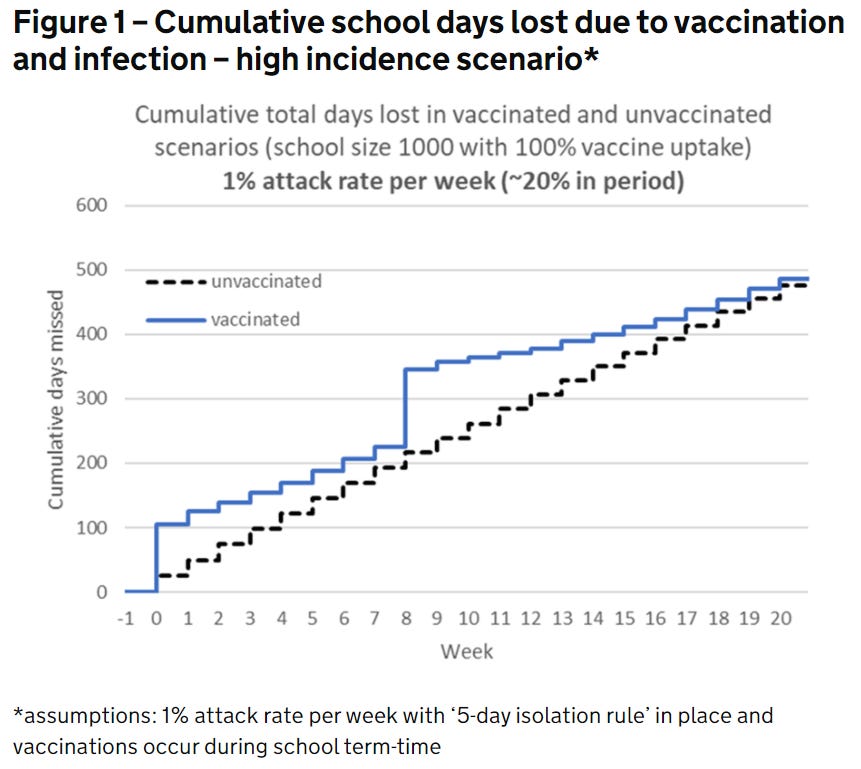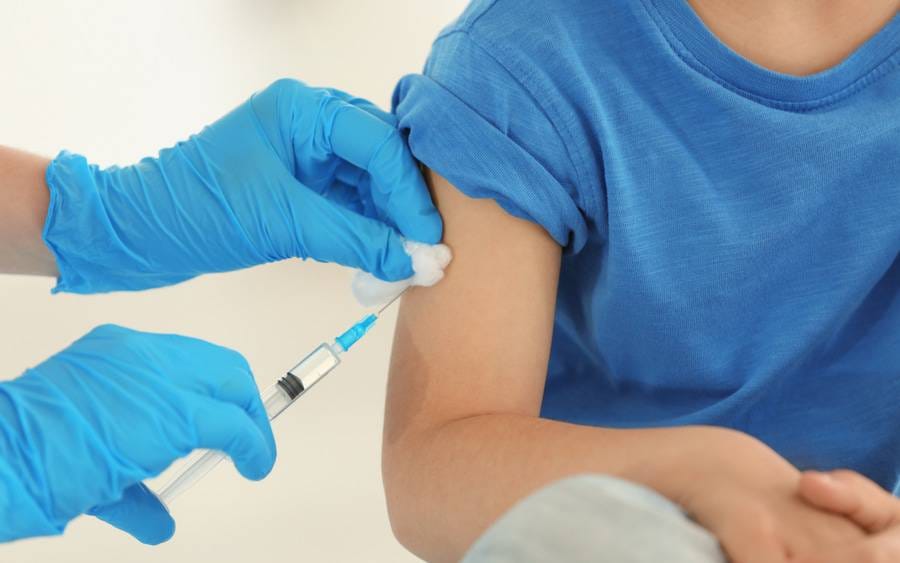Your support is very much appreciated. My articles and research take up a considerable amount of time and hopefully, with your support, the quality and quantity will keep increasing. Please consider taking out a paid subscription to support independent investigative journalism.
UPDATE - As pointed out by James Doidge, the JCVI take estimates for protection of prior infection against symptomatic disease and apply it to estimates of severe disease, thereby overestimating benefits by a lot. If true protection against severe disease is 95%, they overestimate protection by 6x - 10x. If protection is 99% then overestimated by 30x - 50x.
Furthermore, their own graph shows that vaccination actually causes more disruption to schooling.
Today, England approved COVID-19 vaccinations for children aged 5 to 11 years old. Wales and Scotland had already done so earlier in the week so England’s approval was inevitable. Approval for children in this age category, who are in a clinical risk group, was already given on 22 December 2021.
The Joint Committee on Vaccination and Immunisation (JCVI) have just published their independent report as to why the decision has been made.
Before I look at the report, I want to give a little background information.
In September 2021, before the Omicron variant (so a more virulent Delta was prevalent), the JCVI looked at whether to vaccinate healthy 12 to 15 years olds (those without underlying health conditions). They agreed a precautionary approach “given the very low risk of serious disease in those aged 12 to 15 years without an underlying health condition that puts them at increased risk. Given this very low risk, considerations on the potential harms and benefits of vaccination are very finely balanced”.
They acknowledged that “there is increasingly robust evidence of an association between vaccination with mRNA COVID-19 vaccines and myocarditis”. They say that whilst myocarditis following vaccination is self-limiting and resolves within a short time, the medium to long-term prognosis (including the possibility of persistence of tissue damage resulting from inflammation) is uncertain.
The JCVI concluded that overall “benefits from vaccination are marginally greater than the potential known harms” but acknowledged “that there is considerable uncertainty regarding the magnitude of the potential harms. The margin of benefit, based primarily on a health perspective, is considered too small to support advice on a universal programme of vaccination of otherwise healthy 12 to 15-year-old children at this time. As longer-term data on potential adverse reactions accrue, greater certainty may allow for a reconsideration of the benefits and harms.”
So the conclusion for this older age group, on a health perspective, was not to vaccinate unless clinically vulnerable.
Fast-forward a few months, add in a more mild variant and suddenly the advice changes for an even younger age group. What has changed? Where is the longer-term data that allowed them to reconsider the benefits and harms?
From the outset of this latest advice, a cynical mind might think that they are trying to absolve themselves of all liability. The report uses lots of language such as “JCVI advises a non-urgent offer of two doses” and “informed consent”.
The report begins by saying that the “intention of this offer is to increase the immunity of vaccinated individuals against severe COVID-19 in advance of a potential future wave of COVID-19”. But concludes, “as the COVID-19 pandemic moves further towards endemicity in the UK, JCVI will review whether, in the longer term, an offer of vaccination to this, and other paediatric age groups, continues to be advised”.
So vaccination is advised to prevent severe Covid in a future wave but as we reach endemicity that future wave may never occur. It seems like this decision is based on modelling and we all know how accurate these models are at forecasting.
In summing up the key considerations they actually state the reasons why vaccination is unnecessary. “Most children aged 5 to 11 have asymptomatic or mild disease…[and] are at extremely low risk of developing severe COVID-19 disease. Of those admitted to hospital over the last few weeks comprising the Omicron wave, the average length of hospital stay was 1 to 2 days. A proportion of these admissions are for precautionary reasons”.
They continue “it is estimated that over 85% of all children aged 5 to 11 will have had prior SARS-CoV-2 infection by the end of January 2022…Natural immunity arising from prior infection will contribute towards protection against future infection and severe disease.”
The report says the vaccination is “anticipated to prevent a small number of hospitalisation and intensive care admissions. The extent of these impacts is highly uncertain."
Detailed considerations included evidence on:
potential direct health benefits and harms
indirect educational impacts of vaccination
wider anticipated opportunity costs
Looking at number 1. In addition to the points made above the JCVI say “there are some data to suggest that natural immunity may last longer than vaccine-induced immunity against non-severe infection”.
They repeat the unknown long term issues from myocarditis from the previous report and say that there are less than 2 cases per million doses. It then considers how many cases are prevented per million vaccine courses and it looks at two scenarios. The first is a future wave similar to Delta and the second is a future wave similar to Omicron.
The future Delta wave would prevent 98 hospitalisations due to acute COVID-19 and 3 ICU admissions. 10,300 doses would be needed to prevent 1 hospital admission and 340,000 doses needed to prevent 1 ICU admission.
A future Omicron wave would prevent 17 hospitalisations and 0.5 ICU admissions. 58,000 doses would prevent 1 hospitalisation and 1,900,000 an ICU admission.
Something I found interesting was that when comparing with the September report for older children, vaccinating in the Delta wave scenario in this report actually prevented more hospitalisations and ICU admissions. This is even after 85% have already been naturally infected. For the 12-15 year olds, vaccination prevented 92.76 hospitalisations and 2.54 ICU admissions but for the 5-11 year olds it prevented 98 and 3 respectively.
Next they look at number 2 - education. However, in the executive summary they already conclude that “the impact of vaccination on school absences was indeterminate”. No need to look any further there then. We know that education has been impacted due to isolation rules for mainly asymptomatic kids so vaccination would do little to change that.
And finally number 3 - wider opportunities.
Here the JCVI are worried about the adverse effects on other childhood immunisation programmes. They say “as the UK moves towards ‘living with COVID-19’, these considerations of the opportunity costs related to COVID-19 vaccinations assume increasing importance, particularly where the direct health benefits from vaccination are more marginal.”
So to conclude, advice for older age groups in September was that, on balance, the potential adverse reactions outweighed any benefits. Since then, the only thing that has changed is a more mild variant has come along and more kids have been infected. The JCVI acknowledge natural infection’s ability to protect so why not advise that if a child has been previously infected, vaccination is not necessary or advised?
Why the change since September? Is there further data they have not released showing an increased concern for future variants against children or evidence that adverse reactions are no longer as worrisome as first thought?
It seems that any benefit of vaccinating this younger age group is based on modelling, which is more often than not, completely wrong. They even conclude by saying “vaccination of children aged 5 to 11 is not expected to have an impact on the current wave of Omicron infection. The potential benefits from vaccination will apply mainly to a future wave of infection; the more severe a future wave, the greater the likely benefits from vaccination. Conversely, the less severe a future wave, the smaller the likely benefits from vaccination”.







Get yourself some Chemo in case you get cancer.
That’s the argument. Clowns
What's changed is that they've got rid of the 'awkward ones' on the committee.
The result is they're advising that children be vaccinated for a disease that doesn't exist (yet).